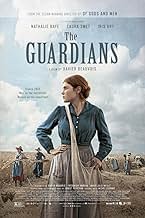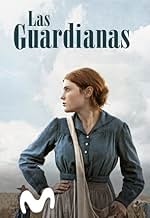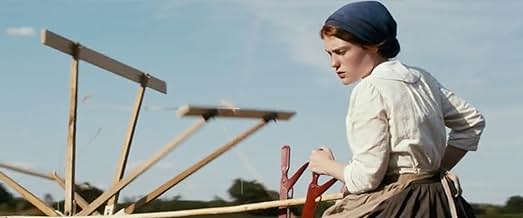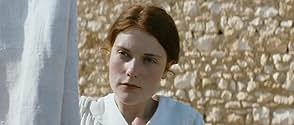IMDb RATING
6.7/10
2.7K
YOUR RATING
Women are left behind to work a family farm during the Great War.Women are left behind to work a family farm during the Great War.Women are left behind to work a family farm during the Great War.
- Awards
- 11 nominations total
Mathilde Viseux
- Marguerite Sandrail
- (as Mathilde Viseux-Ely)
Featured reviews
Photography is beautiful and the actors do their best with a script which is anaemic in comparison with the novel on which the film is based. Many of the more interesting characters in the book are omitted, along with half of the setting - the people who live on the waterways. The ending is unbelievable.
Xavier Beauvois just does the most beautiful films. As with Of Gods and Men, The Guardians is full of quiet dignity and humanity, and it gets the emotions just right. There are so many films about the battlefront, it's great to see one focussed on the scene back home and on women's work, their hopes, their endurance, their grief, and even their betrayals. The pace is slow, and follows the events of the narrative as much as the seasons and the labour they entail. Beauvois is someone who takes the time to show people who are not often seen on screen go about their everyday life, their toil. When do we get to see women shovelling dirt, feeding fodder to cattle, or doing the harvest? It's sometimes hard to believe this takes place between 1916-20 and the contrast with our post-post-modern world is all the more valuable. We're lucky that a director of such talent chooses topics like this for his work.
"Two years of hell, some people went mad." "After the war, it will be different." Constant (Nicolas Girard)
The WWI soldier, Constant, in director Xavier Beauvois' The Guardians, captures the ambivalence of the "the war to end all wars": combat insanity that comes home with soldiers and the hopeless hope the world will be a better place. The only "better" is the film's depiction of strong women taking the reins of a farm, modernizing it and making a profit.
It's a small village whose story begins in 1915 and ends in 1920 in rural France, just long enough for women to take prominent places in the farms at home and for their returning men to find adjustment a challenge as they carry the memories of unspeakable horrors in the trenches of that "great war."
Hortense (Nathalie Bye), an aging owner of a working farm, rides the plow while she attends to the politics of the large farm without the crutch of a domineering male. She does well enough to engage the services of a young maid, Francine (Iris Bry), who is a change agent for Hortense and her soldier son and a signal of the complications war brings to the world.
The cinematography is a perfect reflection of the tranquil country side lost in a trance of bucolic tasks until the war's change agents arrive. Leave it to French cinema to languish over faces and landscapes, as if Manet or Constable were the artistic director. The slowly panning shots of laborers are as softly powerful as paintings in the camera's movement.
The Guardians is one of the most beautifully photographed and quietly told stories of women abiding the tyranny of war with an aplomb unseen in modern cinema. This minimalist epic is one of the year's best films and an appropriate emblem of the French ability to make cinema art. All other cinema pales by comparison.
The WWI soldier, Constant, in director Xavier Beauvois' The Guardians, captures the ambivalence of the "the war to end all wars": combat insanity that comes home with soldiers and the hopeless hope the world will be a better place. The only "better" is the film's depiction of strong women taking the reins of a farm, modernizing it and making a profit.
It's a small village whose story begins in 1915 and ends in 1920 in rural France, just long enough for women to take prominent places in the farms at home and for their returning men to find adjustment a challenge as they carry the memories of unspeakable horrors in the trenches of that "great war."
Hortense (Nathalie Bye), an aging owner of a working farm, rides the plow while she attends to the politics of the large farm without the crutch of a domineering male. She does well enough to engage the services of a young maid, Francine (Iris Bry), who is a change agent for Hortense and her soldier son and a signal of the complications war brings to the world.
The cinematography is a perfect reflection of the tranquil country side lost in a trance of bucolic tasks until the war's change agents arrive. Leave it to French cinema to languish over faces and landscapes, as if Manet or Constable were the artistic director. The slowly panning shots of laborers are as softly powerful as paintings in the camera's movement.
The Guardians is one of the most beautifully photographed and quietly told stories of women abiding the tyranny of war with an aplomb unseen in modern cinema. This minimalist epic is one of the year's best films and an appropriate emblem of the French ability to make cinema art. All other cinema pales by comparison.
A war film about the women left behind to struggle to work the land, with a classic tale of class, love and rejection, and final survival.
The film follows the rhythms of the farming year with the most gorgeous photography, lingering on details, faces, animals. I usually like films to have pace, but this one is most rewarding without that, and has strong emotional heft. The passion for the land runs deep both in rural areas, and French literature, and finds its cinematic expression here, notably at the end. The grief and anguish as telegrams come of death and capture Is finely portrayed.
Francine, the hard working orphan , well played, attracts our sympathy and support . If Hortense, the widowed farm owner, is a strong character, Francine is even more so, a survivor.
The film follows the rhythms of the farming year with the most gorgeous photography, lingering on details, faces, animals. I usually like films to have pace, but this one is most rewarding without that, and has strong emotional heft. The passion for the land runs deep both in rural areas, and French literature, and finds its cinematic expression here, notably at the end. The grief and anguish as telegrams come of death and capture Is finely portrayed.
Francine, the hard working orphan , well played, attracts our sympathy and support . If Hortense, the widowed farm owner, is a strong character, Francine is even more so, a survivor.
Xavier Beauvois back in the 1990's made a very good film ' N'oublie pas que tu vas Mourir '. I saw it at a Florence film festival and was impressed especially as it approached the subject of AIDS from a heterosexual perspective. AIDs, drugs in Amsterdam and the former Yugoslavian civil wars was quite a combination, and for me it worked. It was stark and not made as a crowd pleaser and I admired him for it. I have lost track of his work since then, but after being on the shelf for a while I watched ' Les Gardiennes '. At first I was impressed by the routine lives set in rural France during WW1 and how the women coped with their lives, fathers and sons fighting. But as the film progressed I got bored with the prettiness of the photography and also the music which was bland given the subject matter. The central point of interest was the predicament of the character played very well by Iris Bry, and her unfair endurance at the hands of a so called ' normal ' family. Keeping the family together at all brutal costs is not in my code of existence, and Nathalie Baye ( excellent as always ) as the mother turned from understandable grief at the loss of a son to a moral monster. The young woman's predicament was distantly related to Thomas Hardy's ' Tess of the D'Urbervilles ' and her resilience similar, although fortunately she does not end up on the gallows. All the same the complicit togetherness of the family structure fortified by the mother repelled me, and the last scene of the film with its perfunctory open ended optimism stretched endurance to its limit. Overall the film seemed swamped by its ' beauty ' and no doubt many have liked that approach. The brief and truthfully shown war scene where all men on either side are seen as equals in the needlessly cruel hands of those who caused it was excellently portrayed. The pity of war was apparent. The pitiless huddling together of the remaining ' family ' was not. A 6 for the portrayal of the cyclic seasons and the long painful years which is rarely done in the cinema, and with less picture postcard photography and a less barbaric family I could have given it a 10.
Did you know
- TriviaThe film, starring Nathalie Baye and her real life daughter Laura Smet, was released the same day Johnny Hallyday, Laura's father, died.
- GoofsIn the opening scene, which is set in 1915, the dead German soldiers are wearing the later style helmets that were not introduced until at least a year later.
- SoundtracksLa Chanson des Blés d'Or
Music by Frédéric Doria
Lyrics by Camille Soubise and L. Lemaître
Performed by Iris Bry
- How long is The Guardians?Powered by Alexa
Details
- Release date
- Countries of origin
- Official sites
- Languages
- Also known as
- Les gardiennes
- Filming locations
- Montrol-Sénard, Haute-Vienne, France(village church and school)
- Production companies
- See more company credits at IMDbPro
Box office
- Budget
- €8,900,000 (estimated)
- Gross US & Canada
- $177,331
- Opening weekend US & Canada
- $7,479
- May 6, 2018
- Gross worldwide
- $4,167,608
- Runtime2 hours 18 minutes
- Color
- Aspect ratio
- 2.39 : 1
Contribute to this page
Suggest an edit or add missing content
















